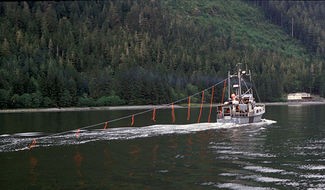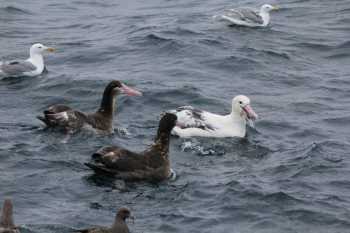Ed Melvin (Washington Sea Grant & School of Aquatic & Fishery Sciences, University of Washington, Seattle, USA) writes on-line this month in the magazine Fishermen’s News of progress with adopting bird-scaring (streamer) lines to reduce seabird mortality, especially of albatrosses, in the USA’s west coast waters.

A deployed streamer line, photographed by Ed Melvin
His article outlines existing regulations and makes a call for the industry to help “test various streamer-line designs and other mitigation options on boats catching West Coast sablefish [Anoplopoma fimbria], the fishery most prone to seabird bycatch”.
Ed writes: “…next year … regulations under a year-old US Fish and Wildlife Service biological opinion kick in. The opinion states that bycatch should not exceed two short-tailed albatrosses [Phoebastria albatrus] every two years in the entire Washington, Oregon, and California groundfish fisheries (longline, pots and trawl) – starting now, in the 2013 season. It also requires that every longliner 55 feet or longer deploy two streamer lines starting in 2014. These new regulations are scheduled for final action at the November 2013 Council meeting and are expected to take effect with the 2014 season.”

Short-tailed Albatrosses: at risk to longliners, photographed at sea by Rob Suryan
“This action was catalyzed by the 2011 hooking of an endangered short-tailed albatross by a boat catching sablefish off the Oregon coast and the ongoing takes of black-footed albatross [P. nigripes] (more than 40 per year on average) by West Coast longliners.”
References:
Melvin, E.F. 2002. Streamer lines to reduce seabird bycatch in longline fisheries. Seattle: Washington Sea Grant Program. 2 pp.
Melvin, E.[F.] 2013. West Coast longliners must learn to stream. Fishermen’s News 69(11).
John Cooper, ACAP Information Officer, 04 November 2013

 English
English  Français
Français  Español
Español